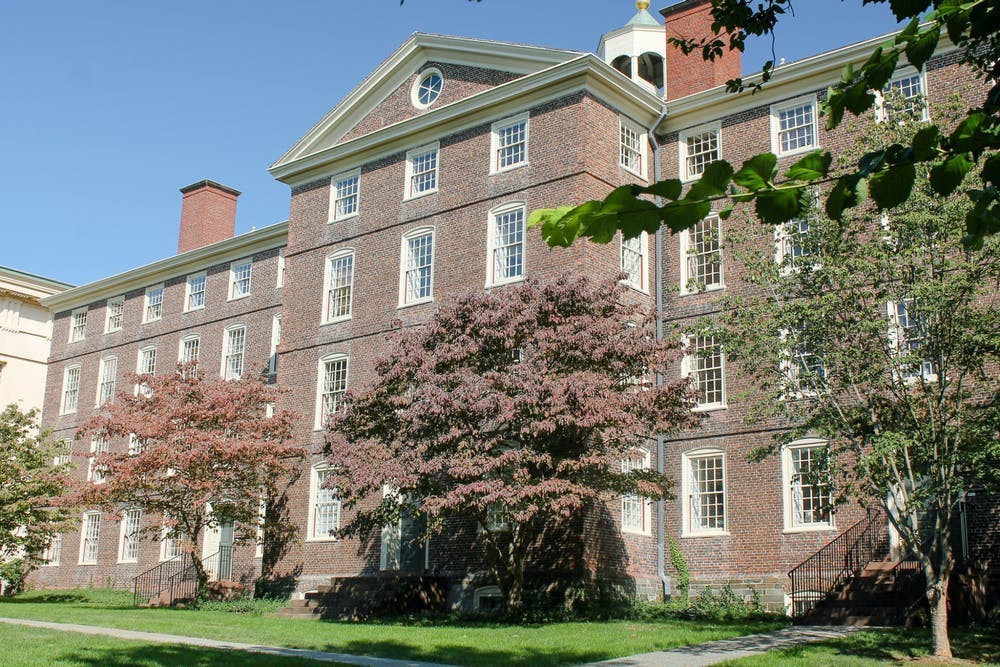The University launched the Program on Innovation and Financial Sustainability Oct. 6 to combine the findings of the Ad Hoc Committee on Promoting Financial Health and Sustainability with those of the Education Innovation Committee, according to a Today@Brown announcement from President Christina Paxson P’19. The program will implement recommendations from both committees through work groups to “yield real and lasting impact.”
The program, which will be overseen by Provost Richard Locke P’18; Russell Carey, executive vice president for planning and policy; Sarah Latham, vice president for finance and administration and Paxson, will comprise nine work groups composed of faculty, staff and students.
The groups’ focuses include administrative support networks, strategic sourcing, information technology, educational innovation and undergraduate enrollment, travel management, event management, executive and master’s programs, online programs and winter, summer and pre-college programs.
“The work groups of (the) Program on Innovation and Financial Sustainability will develop action steps and initiatives that will benefit all faculty, staff and students,” Paxson wrote in the announcement. “I have no doubt that these efforts will contribute to making Brown a stronger and more resilient university and community.”
Paxson charged the Ad Hoc Committee on Promoting Financial Health and Sustainability with creating recommendations to ensure the long-term financial health of the University in fall 2020 in the face of increasing economic vulnerabilities, such as reliance on tuition, according to the announcement. The committee was chaired by Locke and consisted of staff, students and faculty.
The committee was charged with two aims for its deliberations — exploring options for using the University’s assets to generate further revenue and slowing the growth of the University’s operational expenses — Jay Rowan, chief of staff to the provost and associate provost of strategy, wrote in an email to The Herald.
The committee’s charge also emphasized the importance of eliminating “the University’s relatively small but persistent structural deficit” to bolster focus on academic excellence, according to the committee’s final report.
The report predicts that full implementation of its recommendations will yield $6 million to $7 million in savings annually, and $20 million to $50 million in new revenue.
The committee was given detailed information about all areas of its founding goals before focusing specifically on the work of one of its subgroups, wrote committee member Alastair Tulloch GS in an email to The Herald. After several months of work within these subgroups, the entire committee reconvened to “review and revise all recommendations,” he added.
“I am happy with the outcome of the committee, and it appears that the University is wholly committed to moving forward with the recommendations put forward,” Tulloch wrote. “Some of the proposals are already in early stages of execution, and I hope that over the next several months and years the recommendations from each subgroup will be noticeably enacted across campus.”
Rowan, who is serving as the program’s implementation lead, cites the diverse array of perspectives on the committee and collection of community feedback as indicators of the strength of the committee’s in developing “balanced and appropriate recommendations to achieve its goals.”
The Education Innovation Committee has been working since the spring to build on the innovation born out of the COVID-19 pandemic, such as “access, flexibility and equitable assessment in the educational opportunities,” according to the announcement.
Though the work of the Education Innovation Committee is ongoing, the Committee on Promoting Financial Health and Sustainability released its final report Oct. 1. Paxson accepted all its recommendations, which include creating “centers of excellence” of shared staff who are knowledgeable in certain transactions and expanding academic offerings, such as the pre-college program.
The committee also recommended reducing University travel and in-person events in order to “promote access, reduce travel time on and around campus and enhance the quality of critical in-person events,” Paxson wrote.
Tulloch is optimistic that the application of the recommendations of the Committee on Financial Health and Sustainability will advance the long-term financial goals of the University.
“Each of the recommendations are equally important to enhance the experiences of faculty, staff and students in different ways, but with the same goal to improve the culture and community at Brown,” he wrote. “Though there is always room to improve specific functions and services of the University, many specific improvements are either outside of the scope, or are captured within the broader aims and recommendations outlined in the report.”
The recommendations of the committee and their implementation will help the University invest in its mission by “increasing financial aid, recruiting additional faculty and supporting our staff,” Rowan wrote.
“We can only live our values, fulfill our mission and make an impact if we have the resources to do so,” Rowan added. “The impact of this Committee — and the significant effort that went into developing the recommendations — will be to help address the University’s relatively small but persistent structural deficit and ensure we have the resources to fulfill our mission.”





